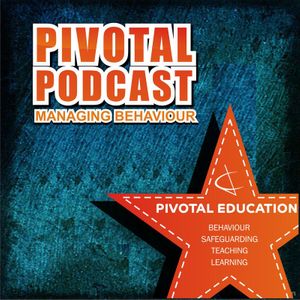Tom Vodden on Behaviour Data: Rational, responsive and real – PP92
Pivotal Podcast - Un pódcast de Pivotal Education

Categorías:
We spoke to Tom Vodden this week about a subject which is not always seen as relevant or exciting. However, as you will hear in this episode, it’s can be very interesting and hugely beneficial to schools! Tom trained as a secondary RE specialist and has taught in mainstream and special schools in England and Australia. He is the originator of the Sleuth Behaviour Tracking and Reward System and a Director of the School Software Company. Tom now works as a consultant and trainer he has worked with hundreds of mainstream, special schools and PRUs with a specific focus on inclusion and behaviour management and support. Tom has been engaged as an Associate Lecturer at the University of Bristol and sits on the National Council of SEBDA, an association which represents and supports professionals and young people within the field of Social, Emotional and Mental Health. Tom has always been interested in helping schools to manage behaviour in a more pro-active and strategic way. He finds that there is often a lack of information collected by schools about behaviour and this leads to a lack of ability to create effective strategies and inform conversations and communicate about behaviour effectively. This led to the creation of the ‘Sleuth’ behaviour tracking system and Tom now works with over 1,000 schools across the UK and abroad. What behaviour data should schools be tracking on individuals? Tom believes there is an important distinction between data and information. Schools often collect a lot of data about behaviour but this is not always translated into something meaningful – proper information which can inform practice. The data should be used to develop our understanding of the challenges and obstacles young people face. So it might be useful to track: * Which times of day a learner may find challenging * Particular days of the week which are problematic * Specific types of behaviour which could be shared amongst teachers to inform practice * Things that the learners do well – so we can celebrate these things This means that what we do in schools can be properly evidence-based. Otherwise, we can quickly build up very negative perceptions of the child and set up self-fulfilling prophesies. Great data collection can enable us to help individuals by: * Tweaking timetables * Support staff working with the individual * Set appropriate targets * Celebrate successes * Share the information in a constructive way with parents How do you make it easy for teachers to collect the data? We need to be realistic about what information we collect. Schools need to identify a threshold which is the trigger for collecting information, both good and bad about a pupil’s behaviour. The outcomes for the information also need to be identified. It all needs to be based on policy, ethos and values – it’s not a bolt on, it’s part of the fabric of the school. Processes can be simplified – for example, simply putting an individual stamp in every child’s planner can be replaced with a single form – but this always has to be tied into the overall behaviour management practice of the school in order to be effective. How can teachers then use the data to understand more about the quality of interventions? It’s important to be able to see how behaviour in a school looks over time. If a specific intervention has been put in place I need to be able to see if this has had an impact over time. If I have been capturing data about my tutor group, for example, the progress of what I am doing needs to be shared with the tutor group regularly, perhaps even every morning. This also needs to be shared with and readily available to everyone in the school who also comes into contact wi...